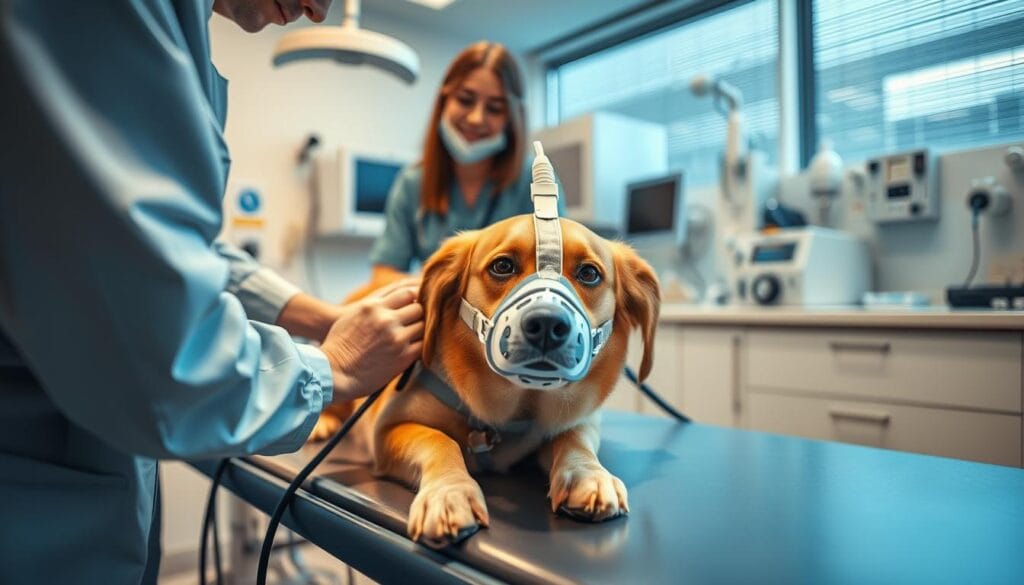Why Is My Dog Breathing Heavy? 10 Signs & Solutions
Did you know a healthy dog breathes about 10 to 35 times a minute? If your dog Breathing Heavy more than 40 times a minute while resting, it’s a sign of trouble. Heavy, fast breathing in dogs can mean many things, like respiratory issues or heatstroke.
Table of Contents
As a pet owner, knowing when your dog’s breathing is off is key. We’ll look at why dogs breathe heavily, the signs to watch, and how to help them breathe better.
Key Takeaways
- The normal respiratory rate for a healthy dog is 10-35 breaths per minute, with an average of 24 breaths per minute at rest.
- Rapid breathing, defined as more than 40 breaths per minute, can indicate an underlying health issue.
- Dog Breathing Heavy can be caused by respiratory conditions, heart problems, heatstroke, and other factors.
- Recognizing the signs of respiratory distress, such as labored breathing and changes in gum color, is crucial.
- Seeking prompt veterinary care is essential when your dog is experiencing abnormal breathing patterns.
Understanding Normal Dog Breathing Patterns
Knowing what normal dog breathing looks like is key to spotting problems early. Dogs should breathe calmly through their nose when they’re relaxed. The normal breathing rate for dogs ranges from 10 to 35 breaths per minute. Puppies, however, breathe a bit faster, between 15 to 40 breaths per minute.
Different Types of Normal Breathing
Dogs breathe differently based on how active they are and their surroundings:
- Panting is a normal way for dogs to cool down after exercise or in the heat.
- When dogs sleep, especially in the REM stage, they breathe faster than when awake.
Normal Breathing During Rest vs Activity
A dog’s normal dog breathing patterns change with their activity level. At rest, dogs breathe quietly through their nose. But when they’re active or in the heat, they pant to cool down.
Keep an eye on your dog’s breathing and watch for any big changes. These could signal health problems. If you see anything odd, talk to your vet right away.
Common Causes of Dog Heavy Breathing
Dogs can breathe heavily for many reasons. This includes respiratory problems and environmental factors. Knowing why your dog breathes heavily is key to helping them feel better.
Respiratory issues like chronic bronchitis and tracheal collapse are common. These problems make it hard for dogs to breathe properly. This leads to fast, labored breathing.
Heart and lung diseases, like congestive heart failure, also cause heavy breathing. Hormonal imbalances, such as Cushing’s syndrome, can have the same effect.
- Respiratory infections, including kennel cough
- Anemia and other blood disorders
- Anxiety and stress
- Obesity and lack of exercise
- Exposure to extreme heat or humidity
Some dog breeds, especially those with short muzzles, are more likely to have breathing problems. These breeds need extra care to keep their breathing healthy.
| Condition | Description |
|---|---|
| Chronic Bronchitis | A long-term inflammation of the airways, making it difficult for dogs to breathe |
| Laryngeal Paralysis | A condition where the larynx (voice box) is unable to open properly, obstructing airflow |
| Tracheal Collapse | The trachea (windpipe) becomes narrowed, leading to respiratory distress |
| Congestive Heart Failure | The heart is unable to pump blood effectively, causing fluid buildup in the lungs |
| Pneumonia | Inflammation and infection of the lungs, making it difficult for dogs to breathe |
If your dog is breathing heavily, get them to the vet. They can find out why and help your dog feel better. With the right treatment, many breathing problems can be managed.
Signs of Respiratory Distress in Dogs
It’s vital to know the signs of respiratory distress in dogs. This condition can be very serious. Look for heavy, labored breathing, pale or bluish gums, and a dog that pants a lot but doesn’t open its mouth. Also, watch for a dog that looks very upset.
Emergency Warning Signs
Some signs mean you need to get your dog to the vet right away. Look for bluish gums or tongue, extreme trouble breathing, and a dog that can’t relax. These are signs of serious trouble that need quick help from a vet.
When to Contact Your Veterinarian
If your dog’s breathing seems off, even if it’s not an emergency, call your vet. Sounds like wheezing or snorting could mean a problem. Always reach out to your vet for any unusual breathing in your dog. Respiratory issues can get worse fast and be very dangerous.
| Breathing Rate | Normal Range | Veterinary Care Needed |
|---|---|---|
| Dogs | 12-40 breaths per minute | Seek immediate care if exceeding 60 breaths per minute |
| Cats | 20-30 breaths per minute | Seek immediate care if exceeding 40 breaths per minute |
Seeing your dog in distress is scary for both of you. By knowing the warning signs and when to call the vet, you can help your dog get the care they need. This could save their life and make them feel better.
Heat-Related dog Heavy Breathing and Heatstroke
As the weather gets hotter, dog owners need to watch their pets closely. Dogs mainly cool down by panting, since they don’t sweat as much as humans. If a dog is panting a lot, it might be too hot or even have heatstroke.
Heatstroke is a big deal for dogs and happens when their body gets too hot. Signs include excessive panting, drooling, reddened gums, vomiting, diarrhea, mental dullness, and collapse. Some dogs, like those with flat faces, are more at risk because they can’t breathe as well.
To stop dog overheating symptoms and heatstroke, give your dog shade, fresh water, and don’t exercise them when it’s hot. If you think your dog has heatstroke, cool them down slowly and get vet help fast. Waiting too long can be very dangerous.
“Heatstroke is a serious and life-threatening condition seen more often in vet clinics during the summer months. Pets can severely overheat, leading to multi-organ failure and death if not treated promptly.”
Knowing the signs of dog panting heavily and keeping your dog cool and hydrated is key. This helps protect them from heat-related illnesses. Being alert and quick to act can save your dog’s life during hot weather.
Medical Conditions Causing Heavy Breathing
If your dog is having trouble breathing, it might be a sign of a health issue. Heart and lung diseases, respiratory infections, and chronic conditions are common causes. These can make it hard for your dog to breathe.
Heart and Lung Issues
Heart disease or congestive heart failure can cause fluid in the lungs. This makes it hard for your dog to breathe. Lung diseases like pneumonia or lung cancer can also affect breathing.
Respiratory Infections
Respiratory infections, such as kennel cough or pneumonia, can make breathing hard. They often cause coughing, sneezing, and nasal discharge too.
Chronic Health Conditions
Chronic conditions like laryngeal paralysis or tracheal collapse can cause breathing problems. Anemia, pain, or certain medications can also lead to heavy breathing.
If your dog is having trouble breathing, get help right away. A vet can check your dog, run tests, and treat the problem. This will help your dog feel better and breathe easier.
Breed-Specific Breathing Issues
Some dog breeds face breathing problems because of their body shape. Breeds like Bulldogs, Pugs, and Boston Terriers have short noses and flat faces. This makes it hard for them to breathe well. They are at a higher risk of brachycephalic airway syndrome.
Larger dogs, like Labradors and German Shepherds, can get laryngeal paralysis. This is when the voice box doesn’t work right. Small dogs, like Chihuahuas and Yorkshire Terriers, often have tracheal collapse. This is when the windpipe collapses.
Knowing about these breathing issues helps pet owners take care of their dogs. Regular vet visits and watching how a dog breathes are key. This keeps their breathing healthy.
| Dog Breed | Breathing Issues |
|---|---|
| Bulldogs, Pugs, Boston Terriers | Brachycephalic airway syndrome |
| Labrador Retrievers, German Shepherds | Laryngeal paralysis |
| Chihuahuas, Yorkshire Terriers | Tracheal collapse |
Keeping a dog at a healthy weight and creating a safe home helps. Also, watching how much they exercise is important. This helps prevent and manage brachycephalic dog breeds and other dog breed breathing problems.

Dog Breathing Heavy While Resting: What It Means
If your dog breathing heavy while resting, it’s key to know why. Heavy breathing can signal health issues like respiratory problems or heart disease. These problems can affect your dog even when they’re not active.
Possible Underlying Causes
There are several reasons why yourdog breathin heavy at rest. Some common causes include:
- Heart and Lung Issues: Heart or lung problems, like congestive heart failure, can make breathing hard for your dog.
- Respiratory Infections: Illnesses like bronchitis or pneumonia can cause airway inflammation, leading to labored breathing.
- Pain and Anxiety: Discomfort from injuries or anxiety can make your dog breathe more quickly at rest.
- Medication Side Effects: Some medications, especially for heart or respiratory issues, can cause heavy breathing as a side effect.
Monitoring Breathing Patterns
Watching your dog’s breathing closely is important for spotting problems early. A healthy dog should breathe 15 to 35 times per minute at rest. If your dog’s rate is over 35 or if you see other breathing issues, call your vet.
Understanding why dogs breathe heavily and watching their breathing can help keep them healthy. If you’re worried, talk to your vet for the right diagnosis and care.
Treatment Options for Heavy Breathing
If your dog is breathing heavily or quickly, finding and fixing the cause is key. Treatment for dog breathing issues can vary depending on the specific condition. Your vet will suggest the best course of action after tests and a check-up.
Some common treatments for dog respiratory problems include:
- Medications like corticosteroids or bronchodilators to reduce inflammation and open airways for respiratory conditions
- Oxygen therapy in severe cases to assist with breathing
- Specific treatments for heart disease or infections causing breathing difficulties
- Surgical interventions, such as laryngeal tie-back surgery, for conditions like laryngeal paralysis
Along with medical treatments, managing your dog’s environment, controlling their weight, and reducing stress can also help. Always stick to your vet’s advice for the best care and monitoring of your dog’s health.
| Treatment Option | Condition | Description |
|---|---|---|
| Corticosteroids | Respiratory Conditions | Reduce inflammation and open airways |
| Bronchodilators | Respiratory Conditions | Relax and dilate airways |
| Oxygen Therapy | Severe Breathing Difficulties | Provide supplemental oxygen to assist with breathing |
| Treatments for Heart/Lung Issues | Heart and Lung Diseases | Address underlying cardiovascular or pulmonary conditions |
| Laryngeal Tie-Back Surgery | Laryngeal Paralysis | Surgical intervention to improve airflow |
By teaming up with your vet to find and treat the cause of your dog’s heavy breathing, you can manage their respiratory issues. This ensures their comfort and well-being.

Prevention and Management Strategies
Keeping your dog’s breathing healthy is key to their happiness. By taking steps to prevent and manage breathing issues, you can help your dog stay well. This ensures they can breathe easily and live a happy life.
One important step is to keep your dog at a healthy weight. Too much weight can strain their breathing. So, feed them right and make sure they get enough exercise. Also, keep them away from things that can harm their breathing, like smoke and strong chemicals.
Regular vet visits are also vital. They help catch and manage health problems early. Your vet can suggest treatments and changes to help your dog breathe better.
- Maintain a healthy weight through a balanced diet and regular exercise
- Avoid exposing your dog to irritants like smoke, strong chemicals, and pollutants
- Schedule regular veterinary check-ups to detect and manage any underlying medical conditions
- Follow your vet’s advice on medication, lifestyle changes, and monitoring techniques for managing known respiratory issues
- Ensure proper dental care to prevent respiratory problems caused by oral infections
For dogs like pugs and bulldogs, it’s crucial to avoid too much activity and hot weather. These can make breathing harder. Taking good care of their breathing can greatly improve their life.
| Preventive Measure | Description |
|---|---|
| Weight Management | Maintain a healthy weight through a balanced diet and regular exercise to reduce strain on the respiratory system. |
| Avoiding Irritants | Minimize exposure to smoke, strong chemicals, and pollutants that can irritate the respiratory tract. |
| Regular Veterinary Check-ups | Schedule routine check-ups to detect and manage any underlying medical conditions early on. |
| Proper Medication and Monitoring | Follow your veterinarian’s guidance on medication, lifestyle changes, and techniques to effectively manage known respiratory issues. |
| Dental Care | Maintain good dental health to prevent respiratory problems caused by oral infections. |
By using these strategies, you can help your dog avoid breathing problems and keep their respiratory health in check. This way, your dog can breathe easily and enjoy a happy, active life.
When Emergency Care Is Needed
Knowing when to seek emergency vet care for your dog’s breathing is key. Heavy or labored breathing can signal a serious issue that needs quick attention.
If your dog has severe breathing trouble, such as extreme effort to breathe, blue or pale gums, collapse, or loss of consciousness, act fast. Call your vet or go to the nearest emergency animal hospital. These signs mean your dog is in a medical emergency and needs help right away.
- Open-mouth breathing at rest
- Excessive drooling
- Inability to lie down comfortably
Rapid breathing with other signs like vomiting, diarrhea, or tiredness also point to serious issues. Don’t wait to get help, as these problems can quickly become deadly for your dog.
| Condition | Symptom | Action Needed |
|---|---|---|
| Seizures | Lasting more than 5 minutes | Seek veterinary care immediately |
| Bloat | Severe stomach distention after a large meal | Call your vet or go to the nearest emergency clinic |
| Urinary Obstruction | Unable to urinate | Seek emergency veterinary treatment |
When it comes to your dog’s dog breathing emergency, it’s always safer to be cautious. If you’re not sure if your dog needs urgent care, call your vet or an emergency animal hospital when to see vet for dog breathing. They can check your dog and give the right treatment to keep them safe.
Conclusion
It’s important to know how your dog usually breathes to spot health problems early. Some heavy breathing is okay, like when they’re exercising or it’s hot. But, if they breathe fast all the time, even when they’re calm, it might mean they’re sick.
Watching your dog closely and taking care of their health is key. Knowing what makes them breathe hard can help you get them the right care. This way, you can keep them feeling good and happy.
Keeping an eye on your dog’s breathing and taking steps to help their lungs is crucial. This knowledge helps you give your pet the best care. It ensures they live a happy and healthy life.







